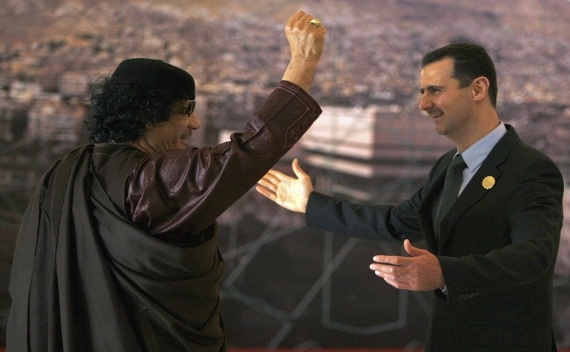First Libya, Now Syria?
More on:

“As Libya Falls, Syria Emerges as Front Line of Arab Uprisings,” read the headline in yesterday’s New York Times. With the apparent fall from power of Muammar Qaddafi, the focus of reporters, analysts, and policymakers has shifted toward Syria, where President Bashar al-Assad remains oblivious to external efforts to compel him to stop the brutal crackdown on civilian protestors, or to step down from power.
Taking a cue from UN Security Council resolutions 1970 and 1973 regarding Libya, the United States and European Security Council members are circulating a draft resolution that would authorize a full arms embargo on Syria (regime and non-regime forces), including any assistance from outside military advisers and trainers. Because some of the same Security Council members openly violated the arms embargo in Libya by providing weapons and military advice to the rebels, Russia is threatening to veto the resolution.
Of course, Russia is less interested in upholding the sanctity of the UN Security Council than retaining the ability to sell weapons to the Assad regime and its neighbors. Seeing market opportunities in the Arab Spring, the head of Rosoboronexport, Russia’s leading arms exporter, told reporters last week: "Naturally we are trying to compensate for the losses we saw due to the events of North Africa.”
While nobody knows how events will play out in Syria, many of us who closely followed the Libyan civil war are now offering our initial “lessons learned” for Syria and beyond. I have such a piece, “Learning from Qaddafi’s Ouster,” in today’s New York Daily News. In it, I offer three lessons: (1) Western leaders who supported Qaddafi’s removal never had an accurate picture of what was going on in Libya; (2) Western policymakers underestimated the operational commitments required to assure the rebels would win; and (3) U.S. officials in particular overestimated how much international military support would be forthcoming.
In addition, I highly recommend this op-ed by my CFR colleague Ed Husain in the Financial Times, “Why Assad Need Not Fear Gaddafi’s Fate;" a piece by Rami Khouri, “Libya’s Lessons for the Arab World;” and an earlier warning on the logic of rhetorical escalation from Eric Martin, “On Rhetoric and Regime Change: This is How I End up Sucked In.”
More on:
 Online Store
Online Store